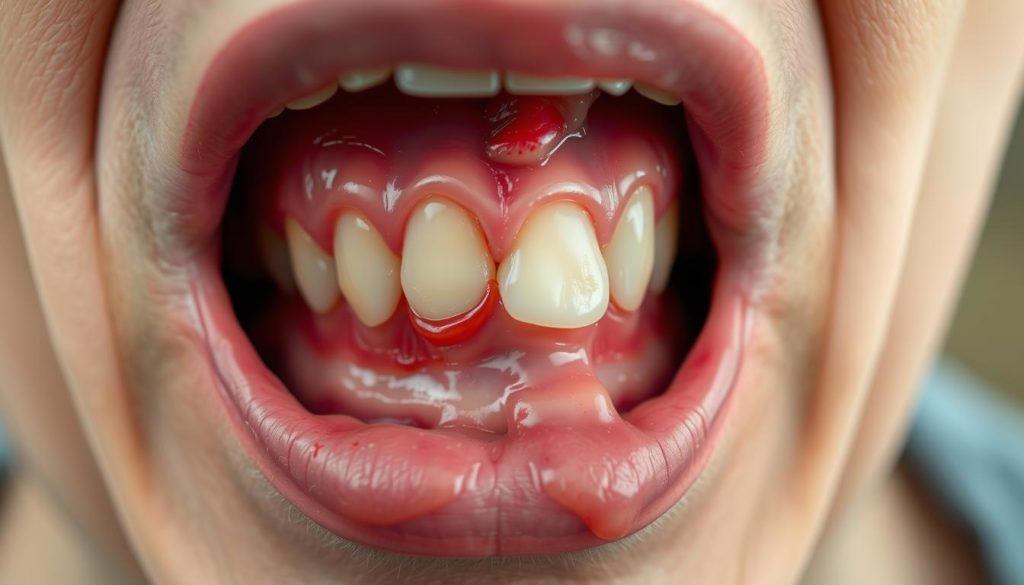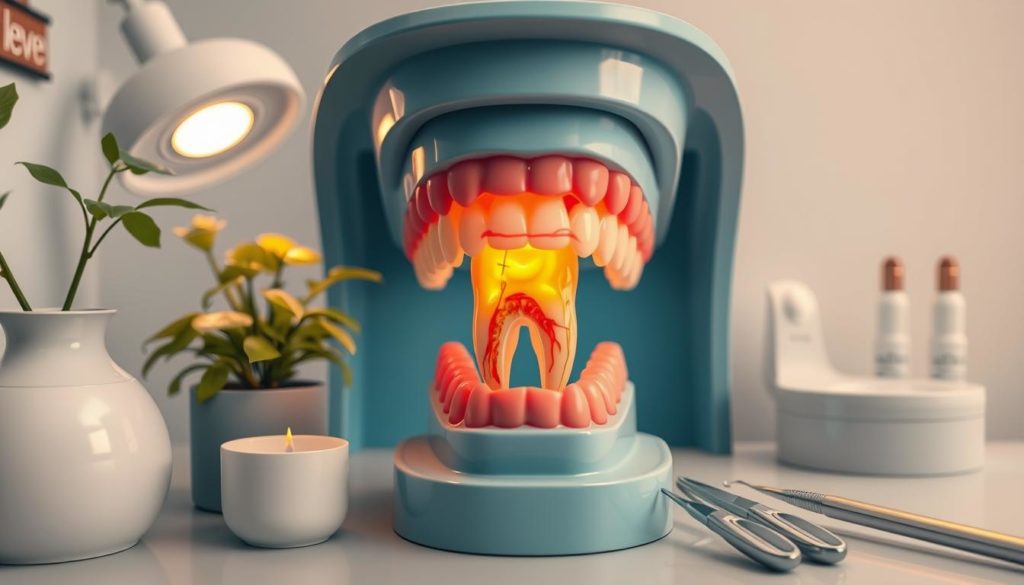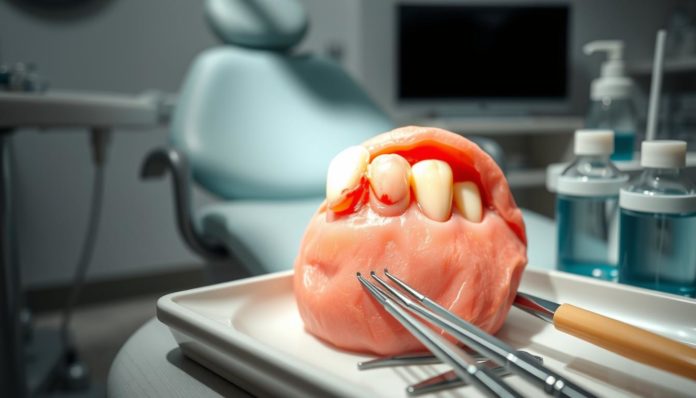Did you know that about 75% of people between 20 and 29 get pericoronitis at least once? This common dental problem can be very painful if not treated quickly.
Knowing about pericoronitis is key. It often happens when wisdom teeth don’t come out fully. This creates a space for food and bacteria to build up. Spotting it early and getting the right treatment is important to avoid serious problems. This article will help you understand the symptoms, causes, and treatments. You’ll be ready to face this dental issue.
Understanding Pericoronitis
Pericoronitis is a common dental issue. It involves inflammation of gum tissue around a partially erupted tooth, often a wisdom tooth. This condition can affect your dental health a lot, showing up as either acute or chronic. Knowing the symptoms and how it impacts dental health is key for early treatment.

The main cause of pericoronitis is gum flaps, or opercula, around the tooth. These flaps trap food and bacteria, leading to infection and gum inflammation. This creates a perfect spot for bacteria to grow, making the condition painful and hard to deal with.
Pericoronitis can happen to anyone, but it’s more common in young adults with wisdom teeth coming in. It’s divided into two types:
- Acute Pericoronitis: This has severe pain, swelling, and makes chewing or opening the mouth hard.
- Chronic Pericoronitis: Symptoms are milder but last longer, causing repeated discomfort.
Spotting pericoronitis symptoms early can stop worse dental problems. Keeping good hygiene and going to the dentist regularly are key to managing and preventing gum inflammation from this condition.
Common Symptoms of Pericoronitis
Pericoronitis shows up in many ways, affecting your daily life. Knowing these signs is key to getting pericoronitis relief fast and easing oral discomfort.
Pain and Swelling
Severe pain and swollen gums are big signs of pericoronitis. This pain hits the wisdom teeth area, making it tough to chew or talk.
Gum Inflammation
Another sign is inflamed gums. The gums near the affected tooth might look red, tender, and swollen. This leads to a lot of oral discomfort.
Difficulty in Opening Mouth
People with pericoronitis often find it hard to open their mouths. This makes speaking, eating, and feeling comfortable a challenge.

| Symptom | Description | Impact |
|---|---|---|
| Pain and Swelling | Severe pain around the wisdom teeth and noticeable swelling | Difficulty in chewing and talking |
| Gum Inflammation | Red, tender, and swollen gums | Significant oral discomfort |
| Difficulty in Opening Mouth | Restraint in jaw movement | Challenges in speaking and eating |
Identifying the Causes of Pericoronitis
Pericoronitis is caused by a mix of factors, mainly related to wisdom teeth and oral bacteria. Knowing these causes helps in preventing pericoronitis.
Partial Eruption of Wisdom Teeth
Partial eruption of wisdom teeth is a big cause of pericoronitis. When wisdom teeth don’t fully come out, they trap debris under a gum flap. This is perfect for oral bacteria to grow, leading to infection and worsening wisdom teeth problems.
Food and Bacteria Trapped
Food and bacteria trapped under a gum flap over a wisdom tooth can cause inflammation and infection. This mix of food and bacteria makes it hard to prevent pericoronitis.
Poor Oral Hygiene
Poor oral hygiene is another major cause of pericoronitis. Not cleaning teeth and gums well leads to plaque buildup. This plaque is full of harmful bacteria, which can cause gum infections, especially around wisdom teeth.
When to Seek Pericoronitis Treatment
Knowing when to get a dental consultation for pericoronitis is key. If you see infection signs, it’s time to act fast.
- Severe pain in the affected area
- Fever
- Pus discharge around the erupting tooth
- Swollen and tender lymph nodes
These signs mean you need to see a dentist right away. Early treatment is crucial for managing pericoronitis.
Here’s a quick guide to help identify critical signs of infection and understand the urgency for professional intervention:
| Symptom | Action |
|---|---|
| Severe Pain | Book a dental appointment immediately |
| Fever | Seek urgent medical attention |
| Pus Discharge | Consult a dentist for antibiotic treatment |
| Swollen Lymph Nodes | Visit a dental professional without delay |
Getting an early diagnosis and starting treatment quickly can help a lot. Timely dental consultations are vital for your oral health.
Effective Pericoronitis Relief Methods
If you’re dealing with pericoronitis discomfort, knowing how to find relief is key. Here are some ways to manage your symptoms. You can try over-the-counter options and natural remedies.
Over-the-Counter Pain Relievers
Start with over-the-counter meds for oral pain relief. Ibuprofen and acetaminophen are good for reducing inflammation and pain. Make sure to follow the dosage and talk to your doctor if you have questions.
Salt Water Rinses
Salt water rinses are a simple yet effective remedy. Mix a teaspoon of salt with warm water and rinse your mouth several times a day. This helps fight bacteria and soothe inflamed gums.
Cold Compresses
Using a cold compress can help reduce swelling and ease pain. Wrap ice cubes in a cloth and press it against the cheek near the inflamed gums. It’s great for quick relief and reducing discomfort.
- Over-the-counter pain relievers like ibuprofen or acetaminophen
- Salt water rinses for disinfection
- Cold compresses to reduce swelling
| Relief Method | Benefit |
|---|---|
| Over-the-Counter Pain Relievers | Reduces inflammation and eases pain |
| Salt Water Rinses | Disinfection and soothing of inflamed gums |
| Cold Compresses | Reduces swelling and provides instant relief |
Home Remedies for Pericoronitis
Looking for natural ways to treat pericoronitis? There are many home remedies that can help. They can ease symptoms and aid in healing.
Herbal Rinses
Herbal rinses are a great natural treatment for pericoronitis. You can make antiseptic mouth rinses with chamomile, sage, or calendula. These herbs can reduce swelling and kill bacteria in your mouth. Just brew them into a tea, cool it down, and rinse your mouth with it twice a day.
Cloves and Clove Oil
Clove oil is known for its pain-relieving and antibacterial properties. It’s a top choice for treating pericoronitis pain. Applying a few drops of clove oil to the affected area can numb the pain and fight off bacteria. Chewing whole cloves is also helpful, as it slowly releases clove oil, providing long-lasting relief.
Hydrogen Peroxide
Hydrogen peroxide is a strong antiseptic that can help with pericoronitis. Mix it with water (half-and-half) and use it as a mouth rinse. It can reduce bacteria, prevent infections, and soothe sore tissues. Using hydrogen peroxide regularly is a good part of your natural treatment plan.
Dental Treatments for Pericoronitis
Dealing with pericoronitis often needs a dentist’s help. There are several ways to treat it, based on how bad it is. Here are the main treatments dentists use:
Professional Cleaning
First, a dentist will clean the area well. This removes food and bacteria around the tooth. It helps reduce swelling and helps the tooth heal. Going to the dentist regularly is key to keeping your mouth healthy and stopping it from coming back.
Antibiotics
If there’s an infection, the dentist might give you antibiotics. These medicines fight the bacteria causing the problem. They help make the symptoms better and stop the infection from spreading, making sure you get the best dental care.
Surgical Procedures
If simple treatments don’t work, surgery might be needed. This could be a small surgery to clean the area or even removing the tooth. Each surgery is designed to fit the patient’s specific needs.
| Treatment Method | Description | Purpose |
|---|---|---|
| Professional Cleaning | Thorough cleaning around the affected wisdom tooth | Reduce inflammation and promote healing |
| Oral Antibiotics | Prescription medication to fight bacterial infection | Alleviate symptoms and prevent infection spread |
| Surgical Procedures | Flap surgery or tooth extraction | Treat severe cases and prevent complications |
Preventing Pericoronitis
Preventing pericoronitis starts with good oral hygiene and regular dental visits. Eating the right foods also plays a big role. Here are some tips to keep your mouth healthy and avoid dental problems.
Maintaining Good Oral Hygiene
Keeping your teeth clean is key to avoiding dental issues. Brush your teeth twice a day, floss, and use mouthwash. This helps remove bacteria and food that can cause gum infections.
Cleaning around your wisdom teeth is especially important. This helps prevent bacteria from building up.
Regular Dental Check-Ups
Going to the dentist regularly is crucial. They can spot problems early, like infections or inflammation around your wisdom teeth. Regular visits also mean you get professional cleanings that are better than what you can do at home.
Avoiding Hard and Sticky Foods
Choosing the right foods can help too. Hard and sticky foods can get stuck in your gums, raising the risk of infection. Stick to softer foods to keep your mouth healthier.
| Preventative Measure | Benefits |
|---|---|
| Brushing and Flossing | Removes bacteria and food particles |
| Regular Dental Examinations | Early detection of issues |
| Avoiding Hard and Sticky Foods | Minimizes food trapped in gums |
Potential Complications of Pericoronitis
Pericoronitis can cause serious problems if not treated. It can harm your oral health and overall well-being. Knowing these risks is key to getting timely dental care and avoiding severe issues.
Spread of Infection
One major risk is the spread of infection. Bacteria can move into deeper tissues. This can lead to serious infections that go beyond your mouth. It’s important to treat it early to stop this.
Damage to Adjacent Teeth
Another big problem is dental damage. Teeth near the infected area can get hurt. This can cause decay and other dental problems.
Difficulty Swallowing
In severe cases, you might have trouble swallowing. This is a serious health risk. It shows the infection has gotten worse and needs urgent care.
| Complication | Impact |
|---|---|
| Spread of Infection | Increase in oral infection risks, potentially spreading to other body parts. |
| Damage to Adjacent Teeth | Leads to dental damage, affecting the health of nearby teeth. |
| Difficulty Swallowing | Severe cases can obstruct swallowing, indicating advanced infection. |
Long-Term Management of Pericoronitis
Managing chronic pericoronitis requires good oral hygiene, regular dental visits, and sometimes surgery. For those with recurring issues, daily care is key. This includes brushing, flossing, and using mouthwashes to fight bacteria. It’s also important to avoid food getting stuck around wisdom teeth.
Dental check-ups are vital for managing pericoronitis over time. Dentists can watch the condition, clean teeth, and give personalized advice. If problems keep coming back, removing wisdom teeth might be needed. This helps prevent future problems and keeps teeth healthy.
Keeping a healthy diet is also important in managing pericoronitis. Eating soft foods and staying away from hard or sticky ones helps. A balanced diet supports good oral health. By following these steps, people can control symptoms and keep their teeth healthy for a long time.
FAQ
What is pericoronitis?
Pericoronitis is a dental issue where the gum around a partially erupted tooth gets inflamed. It often hits young adults when their wisdom teeth start coming in.
What are the symptoms of pericoronitis?
Symptoms include pain, swelling, and red gums. You might also have trouble opening your mouth or taste bad due to infection. Severe cases can bring fever and swollen lymph nodes.
What causes pericoronitis?
It’s mainly caused by wisdom teeth not coming in fully. This creates pockets for food and bacteria. Bad oral hygiene makes it worse, leading to gum inflammation and infection.
How is pericoronitis treated?
Treatment includes dental cleaning, antibiotics, and pain meds. Sometimes, surgery is needed to remove gum tissue or the tooth. Saltwater rinses and cold compresses can help at home.
How can I prevent pericoronitis?
Good oral hygiene, like brushing and flossing, helps prevent it. Regular dental visits are key to check on your wisdom teeth. Avoiding hard and sticky foods also helps.
What are the complications of untreated pericoronitis?
Untreated pericoronitis can cause serious problems. These include spreading infection, damage to nearby teeth, and breathing issues. See a dentist right away if symptoms get worse.
Are there any home remedies for pericoronitis?
Yes, home remedies include herbal rinses and using cloves or clove oil. Diluted hydrogen peroxide rinses can also help. But, these should not replace professional dental care.
When should I see a dentist for pericoronitis?
See a dentist for severe pain, fever, pus, or swollen lymph nodes. These signs mean you need professional help to avoid more serious problems.
Can pericoronitis be a chronic condition?
Yes, it can become chronic if not managed well. To manage it, keep up with good oral hygiene, regular dental visits, and might need surgery to stop it from coming back.
What are some effective ways to relieve pericoronitis symptoms at home?
Use over-the-counter pain meds like ibuprofen or acetaminophen for pain. Saltwater rinses help keep the area clean. Cold compresses can also reduce swelling and ease pain.


